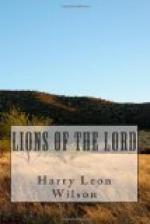Around the broad, gray hat had been a band of braided silver; when he stepped, the spurs on his high-heeled boots had jingled and clanked of silver; around his neck with a knot at the back and the corners flapping down on the front of his blue woollen shirt, had been a white-dotted handkerchief of scarlet silk; and about his waist was knotted a long scarf of the same colour; dogskin “chapps” he had worn, fronted with the thick yellowish hair outside; his saddle-bags, back of the saddle, showing the same fur; his saddle had been of stamped Spanish leather with a silver capping on the horn and on the circle of the cantle; and on the right of the saddle she had seen the coils of a lariat of plaited horsehair.
The picture of him stayed in her mind, the sturdy young figure,—rather loose-jointed but with an easy grace of movement,—and the engaging naturalness of his manner. But after all nothing had happened save the passing of a stranger, and she must go alone back to her dream. Yet now the dream might change; a strange youth might come riding out of the east, sitting a sorrel horse with a star and a white hind ankle, a long rangy neck and strong quarters; and he—the youth—would wear a broad, gray hat, with a band of silver filigree, a scarlet kerchief at his throat, a scarlet sash at his waist, and yellow dogskin “chapps.”
Still, she thought, he could hardly have a place in the dream. The real youth of the dream had been of an unearthly beauty, with a rose-leaf complexion and lustrous curls massed above a brow of marble. The stranger had not been of an unearthly beauty. To be sure, he was very good to look at, with his wide-open blue eyes and his yellow hair, and he had appeared uncommonly fresh and clean about the mouth when he smiled at her. But she could not picture him sighing the right words of love under a balcony in the moonlight. He had looked to be too intensely business-like.
CHAPTER XXXIII.
The Gentile Invasion
When she came across the fields late in the afternoon, the strange youth’s horse was picketed where the bunch-grass grew high, and the young man himself talked with her father by the corral bars. She had never realised how old her father was, how weak, and small, and bent, until she saw him beside this erect young fellow. Her heart went out to the older man with a new sympathy as she saw his feebleness so sharply in relief against the well-blooded, hard-muscled vigour of the younger. When she would have passed them, her father called to her.
“Prudence, this is Mr. Ruel Follett. He will stay with us to-night.”
The sombrero was off again and she felt the blue eyes seeking hers, though she could not look up from the ground when she had given her little bow. She heard him say:
“I already met your daughter, sir, at the mouth of the canon.”
She went on toward the house, hearing them resume their talk, the stranger saying, “That horse can sure carry all the weight you want to put on him and step away good; he’ll do it right at both ends, too—Dandy will—and he’s got a mighty tasty lope.”




